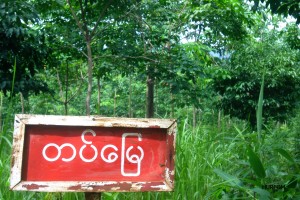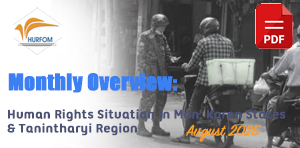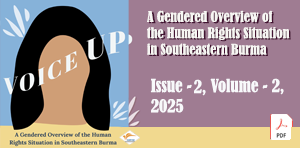Ye Township Residents Recount Trials of Land Disputes with Military
September 16, 2013
HURFOM: Over the course of this year, land owners have contacted HUROM to discuss their feelings about work-restriction of their farmland, six years after being able to return to land that had been confiscated. Residents of Ye Township, Mon State saw much of their land confiscated in 2001 by LIB No. 586, which is under the control of Burmese Military No. 19.
 Myanmar Minister of Defense, Lieutenant-General Wai Lwin, spoke to the media on July 17 and declared that if the military does not work the confiscated farmland that is currently being rented to land owners, the land would be withdrawn.
Myanmar Minister of Defense, Lieutenant-General Wai Lwin, spoke to the media on July 17 and declared that if the military does not work the confiscated farmland that is currently being rented to land owners, the land would be withdrawn.
However, Second Battalion Commander Major Kaung Kyaw has stopped locals from working as tenant farmers. These owners had been permitted to work from 2006 to 2012 by paying a 1.500 kyat rental fee to the Burmese Military for each rubber tree on their plantation. The military is currently refusing to set a rental fee and grant locals permission to work, and is instead allowing the families of soldiers to work the land.
Than Zaw Oo explained the confusion of the locals to HURFOM, “I don’t know why the military doesn’t allow us to remain working the land. This is the first we’ve heard about it. My family lost 10 acres of land that housed 700 rubber plants, so we have had to pay 105.000 kyat in order to be allowed to work on our land. Now I’d like to solicit the help of senior people to intervene and bring justice.”
Many victims of land confiscation have claimed that their rubber plants were harmed by the overuse of chemicals from amateur farmers who do not know how to appropriately care for their rubber trees. Therefore, owners are concerned that if their land is being tended by new, inexperienced farmers, their crops will consequently suffer. Moreover, news of land disputes between locals and soldiers has made the military all the more reluctant to sell the plants to their original owners.
“In the past we were allowed to work if we paid a fee per plant,” recounts Daw Han Sein, a Ye resident who had her 10-acre rubber plantation seized by the military in 2001.
“In late 2012 we adjusted the price and signed a new contract so that we could continue to work. We gave them half the price, but they sold the land to others and returned our payment. We met with an army major to discuss the price for 2013, but he refused our request to decrease the payment from 1.200 kyat to 1.000 kyat, which reflects the change in the price of rubber. On August 29 we went again to the major for negotiations but he said he would not sell the land to anyone and was instead planning to give the land to the families of soldiers. He was worried about military leadership hearing about the land disputes and conducting an investigation. We feared his words because he told us that he didn’t care about our situation and would ‘shoot back’ if needed. We also fear for the health of our plants if they are to have new owners.”
Nai Kyaw Thein, a 50-year old Ye resident offered a similar story about the fallout from land confiscation, “After the land confiscation, the military allowed us to work the land for five years as tenant farmers.
At the end of the five years, we had to pay 500 kyat per rubber plant the first year, 700 kyat the second year and 800 kyat the third year. The price increased all the way to 1.300 kyat per rubber plant. The military intimidated us and constantly reminded us that the land and the plants belonged to them, even though we had paid the money necessary to work the land. They said it wasn’t our property, but theirs. They also forced us to fertilize the land, although we refused. If we had agreed to pay for fertilizer, we wouldn’t have had much money left. We had to pay between 1million and 1.6 million kyat per year for the military’s permission. We’ve heard that they won’t be allowing us to work anymore this year and are instead giving the land to soldiers. We’ve always hoped to get our property back, for the sake of the plantation itself. We’ve suffered for many years already.”
Comments
Got something to say?
You must be logged in to post a comment.



















































